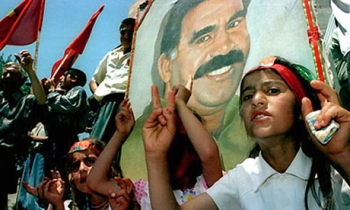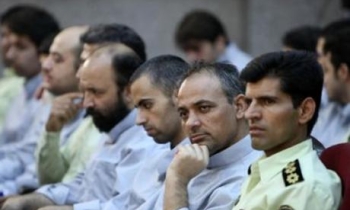ISTANBUL (Reuters) - As many as 100,000 people filed silently through Istanbul on Tuesday to pay their last respects to Turkish Armenian editor Hrant Dink, whose murder has stirred debate about the influence of hardline nationalism in Turkey.
From early morning, tearful mourners, many holding identical black-and-white signs reading "We are all Hrant Dink" and "We are all Armenians", gathered outside the Agos newspaper office where Dink was shot three times in broad daylight last Friday.
White doves were released into the air as somber music played. Much of downtown Istanbul, a sprawling city of some 12 million set on the Bosphorus waterway, was closed to traffic.
A 17-year-old youth, Ogun Samast, has confessed to killing Dink for "insulting" Turks. A nationalist militant friend of Samast has admitted inciting Samast to kill Dink, who had worked for reconciliation between Christian Armenians and Muslim Turks.
"We are seeing off our brother with a silent walk, without slogans and without asking how a baby became a murderer," Dink's widow Rakel, surrounded by her three children, told mourners.
Turkey has become a more open, liberal country in recent years, helped by a series of reforms driven by the country's campaign to join the European Union. But the murder has highlighted the continued influence of ultra-nationalism.
"Seeing this mass of people gives me courage. There are lots of people against racism and nationalism," said Turkish actress Lale Mansur.
Organizers estimated 100,000 mourners followed the black hearse and flower-covered coffin on its 8-km (5 mile) journey across Istanbul and the Golden Horn waterway to an Armenian church. Police said there were tens of thousands.
Ministers, foreign diplomats, Armenian government officials and members of both Turkey's 60,000-strong Armenian community and the global Armenian diaspora joined the funeral service.
Dink was buried at the city's Balikli Armenian Cemetery.
"We still hope that (Turks) ... will accept that the Armenians are Turkish citizens who have been living on this land for thousands of years and are not foreigners or potential enemies," Armenian Patriarch Mesrob II told the mourners.
MASSACRES
Nearly 10,000 people gathered in Armenia's capital to pay their respects to Dink in a memorial ceremony timed to coincide with the funeral in Istanbul. The crowd carried placards saying "We are all Dink!" and "Turkey -- is this your way to Europe?".
Dink, like dozens of other intellectuals including Nobel Literature Laureate Orhan Pamuk, had been prosecuted for his views on the massacres of Armenians by Ottoman Turks in 1915.
Turkish nationalists, including some senior politicians, regard the intellectuals' calls for Turkey to own up to its role in the massacres as a threat to national security and honor.
"This (murder) is not an exceptional case but the result of a poisonous nationalist atmosphere. Turkey's credibility abroad has hit rock bottom," said Vural Oger, a leading Turkish-German businessman and politician.
Turks are taught from early childhood to revere their country, its flag and its founder Mustafa Kemal Ataturk -- but this heavy emphasis on the nation can lead to intolerance for outsiders and has fueled various militant groups over the decades ready to use violence against perceived threats.
A Kurdish insurgency in the southeast, for instance, has raised hardline warnings of a national disintegration that had threatened before Ataturk founded the republic in 1923.
Turkey denies claims by Armenia and other countries that 1.5 million Armenians died in a systematic genocide at Turkish hands, saying large numbers of both Christian Armenians and Muslim Turks perished during the breakup of the Ottoman Empire.
But, to Ankara's dismay, many foreign parliaments have passed laws recognizing the massacres as genocide.
Dink's murder has increased pressure on the pro-EU government to scrap a controversial law, article 301, used against Dink and others to curb freedom of expression. Many mourners carried signs on Tuesday saying "301 -- murderer".
(Additional reporting by Gareth Jones in Ankara, Thomas Grove in Istanbul and Hasmik Mkrtchyan in Yerevan)









